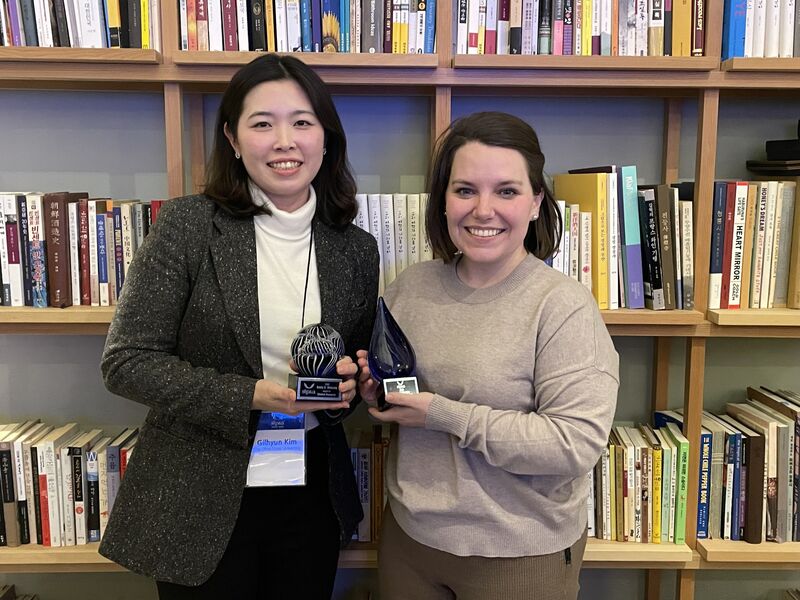Each year, STPA awards two research-based awards during the annual conference. Individuals may indicate their interest in being considered for an award at the time of paper proposal submission and are also required to register for the conference by the announced presenter registration deadline for award consideration.
While multiple proposals may be submitted for consideration to present at the STP&A conference per conference guidelines, any individual may only have one work considered for one conference research award. Should an individual have multiple paper proposals accepted for the conference, they can designate which one is to be considered for an award at the time of conference registration.
Emily Mulcahy Student Research Award
This award recognizes outstanding graduate student research at the masters or doctoral level. The work can be early- or late-stage research associated with a thesis or dissertation; should be sole-authored or sole-led work; and should be independently presented at the conference. The Emily Mulcahy Student Research Award will be determined based on reviews of the written research work and conference presentation. Nominees will submit their written research work approximately 4 weeks in advance of the conference dates.
Student research can be presented up to 18 months post-graduation. If during the 18 months post-graduation, the nominee has taken on a faculty role or other role advancing research and will be in this role at the time of the conference, then the nominee’s work is eligible for the Mulcahy Emerging Scholars Award, not the Emily Mulcahy Student Research Award. Any nominee that holds a faculty role or other commensurate role advancing research who may also be a student is eligible for the Mulcahy Emerging Scholars Award, not the Emily Mulcahy Student Research Award. Exceptional undergraduate research may also be considered for the Emily Mulcahy Student Research Award.
Eligibility summary:
- Individual is currently enrolled as a graduate student at the masters or doctoral level or in limited cases an upper-level undergraduate student.
- Research is sole-authored or sole-led.
- Individual does not hold a faculty or other professional research role at the time of conference presentation.
Mulcahy Emerging Scholars Award
This award recognizes outstanding research by pre-tenured faculty and early scholars.* The work should be approaching or be in late-stage development; should be sole-authored, or the nominee should be the lead author of collaborative work; and should be sole-presented at the conference. The Mulcahy Emerging Scholars Award will be determined based on reviews of the written research work. Nominees will submit their written research work approximately 4 weeks in advance of the conference dates.
*STP&A recognizes that research insights and contributions to the field and its advancement of knowledge stem from a range of arts administration, cultural policy, and adjacent fields and individuals who may hold differently structured roles within and outside academia that produce research and knowledge. Individuals who are not considered to be an emerging scholar by the description of pre-tenure should commensurately have 6 or fewer years of research activity within the field.
Eligibility summary:
- Individual is pre-tenure or meets the criteria of an early scholar with 6 or fewer years of research activity within the field.
- Research is late-stage development; should be sole-authored, or the nominee should be the lead author of collaborative work; and should be sole-presented.
Process & Materials for Awards Consideration
- At the time of submitting a paper proposal, the nominee should indicate their desire to be considered for the Emily Mulcahy Student Research Award or the Mulcahy Emerging Scholars Award, depending on which eligibility criteria they satisfy.
- If the paper proposal is accepted to the conference, then the nominee is required to register for the conference by the presenter deadline for conference registration. In the case that the nominee had multiple paper proposals accepted to the conference, they must designate which paper is to be considered for the award at the time of conference registration.
- Nominees must submit their written work for review by a date to be specified that is approximately four weeks in advance of the conference. Details on the submission process will be provided to nominees closer to the submission date.
- Nominees are to attend and present their paper at the STP&A conference.
Award Selection Criteria
Details coming soon
STP&A’s current Student Research and Emerging Scholar Awards were made possible through a generous gift from Dr. Kevin Mulcahy. Read more about Dr. Mulcahy’s contributions to STP&A in The Journal of Arts Management, Law, and Society.

Prior STP&A Awardees
Emily Mulcahy Student Research Award
| Year | Award Recipient | Presentation |
|---|---|---|
| 2023 | Travis Newton | “Orchestra Community Engagement: A Cross-Sectoral Literature Review Toward a New Cycle of Community Engagement” |
| 2022 | Gilhyun Kim | “New Governance and Citizen Participation in Creative Placemaking” |
| 2019 | Joel Elliott | “Testing the Co-Religionist Hypothesis in Islamic State Propaganda” |
| 2018 | Biyun Zhu | “The Adaptation of Soft Power and Implications in China” |
| 2017 | Divya Janardhan | “Cultural Vitality and Vacuums in the “Donut” City: A case study of Houston” |
| 2016 | Christian Joel Butterworth | “We can’t data everything: What do formalised data sharing policies mean for the publicly funded, UK arts sector?” |
| 2015 | Jin-A Kim | “What Makes Artists Sustain Their Work and Social Survival? : A Case of Gim Gwang Cheol, a Korean Performance Artist” |
| 2014 | Joohee Hong | “Data Envelopment Analysis in the Strategic Management of Youth Orchestras” |
Mulcahy Emerging Scholars Award
| Year | Award Recipient | Presentation/Paper |
|---|---|---|
| 2023 | Dr. Megan Jordan | “Artist Activism as Arts Entrepreneurship: Artists Disrupting Social Structures and Changing the Future,” published in Artivate, Volume 11, Issue 3, DOI: https://doi.org/10.34053/artivate.11.3.194 |
| 2022 | Dr. Rachel Skaggs | Perceptions of Artists & Collective Efficacy |
2022 STP&A Conference Awardees
Emily Mulcahy Student Research Awardee Gilhyun Kim, Department of Arts Administration, Education & Policy, The Ohio State University (L)
Mulcahy Emerging Scholars Awardee Dr. Rachel Skaggs, Department of Arts Administration, Education & Policy, The Ohio State University (R)
2018 STP&A Conference
Recognized for Lifetime Achievement – Dr. Margaret Wyszomirski, Department of Arts Administration, Education & Policy, The Ohio State University (L)
Emily Mulcahy Student Research Awardee Biyun Zhu, Department of Arts Administration, Education & Policy, The Ohio State University (R)


